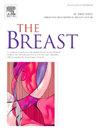Tremelimumab plus durvalumab combined to metronomic oral vinorelbine: Results from the breast cancer cohort of the phase II MOVIE study
IF 7.9
2区 医学
Q1 OBSTETRICS & GYNECOLOGY
引用次数: 0
Abstract
Purpose
MOVIE assessed the enhancement of immunotherapy activity in advanced breast cancer (BC) tumors with metronomic chemotherapy associated to dual ICI combination.
Methods
MOVIE was a national, multicenter, open-label, phase I/II, non-randomized. It tested the antitumor activity and safety of metronomic vinorelbine associated with anti-PD-L1 durvalumab + anti-CTLA-4 tremelimumab using a Bayesian approach. Here, we report on the cohort of patients with advanced BC during MOVIE phase 2. Patients were aged≥18 years with histologically confirmed locally advanced or metastatic breast tumors, resistant to conventional therapies, presenting a measurable disease according to RECISTv1.1. They received vinorelbine 40 mg thrice a week, and durvalumab 1500 mg plus tremelimumab 75 mg at day 1 of 28-day cycles. The primary endpoint was clinical benefit rate (CBR). Secondary endpoints included safety, objective response rate (ORR), progression-free survival (PFS), and overall survival (OS).
Results
Between 2018 and 2020, 30 BC patients, including 19 triple negative breast cancers were enrolled. Mean estimated CBR (95 % credible interval) using a non-informative prior was 15.6 % (5.5–29.8). ORR was 6.7 % (2 PR), median PFS 1.8 months (95 % confidence interval [CI]:1.8–1.8) and median OS 8.8 months (95 %CI:5.6–12.8). Fifteen patients (50.0 %) presented grade≥3 ICI-related adverse events (AEs), mostly fatigue (N = 3; 10.0 %). Grade≥3 vinorelbine-related AEs mostly included neutropenia (N = 5; 16.7 %), and fatigue (N = 3; 10.0 %). Four (13.3 %) patients discontinued their treatment due to treatment-related toxicity. There was no treatment-related death.
Conclusion
Metronomic vinorelbine and durvalumab plus tremelimumab showed limited antitumor activity in pretreated advanced BC. Alternative strategies are warranted to enhance the efficacy of ICI in those tumors.
Trial registration
This trial is registered with ClinicalTrials.gov, identifier NCT03518606.
Tremelimumab + durvalumab联合节拍口服长春瑞滨:来自II期MOVIE研究乳腺癌队列的结果
emovie评估双ICI联合节律化疗对晚期乳腺癌(BC)肿瘤免疫治疗活性的增强。方法smovie是一项全国性、多中心、开放标签、I/II期、非随机的临床试验。它使用贝叶斯方法测试了节拍节拍长春瑞滨与抗pd - l1 durvalumab +抗ctla -4 tremelimumab相关的抗肿瘤活性和安全性。在此,我们报道了MOVIE 2期晚期BC患者队列。患者年龄≥18岁,组织学证实为局部晚期或转移性乳腺肿瘤,对常规治疗有耐药性,根据RECISTv1.1表现为可测量的疾病。他们接受长春瑞滨40毫克,每周三次,durvalumab 1500毫克加tremelimumab 75毫克,在28天周期的第1天。主要终点为临床获益率(CBR)。次要终点包括安全性、客观缓解率(ORR)、无进展生存期(PFS)和总生存期(OS)。结果2018年至2020年期间,纳入了30例BC患者,其中包括19例三阴性乳腺癌患者。使用非信息先验的平均估计CBR(95%可信区间)为15.6%(5.5-29.8)。ORR为6.7% (2 PR),中位PFS为1.8个月(95%置信区间[CI]:1.8 - 1.8),中位OS为8.8个月(95% CI: 5.6-12.8)。15例患者(50.0%)出现≥3级ci相关不良事件(ae),主要为疲劳(N = 3;10.0%)。≥3级长春瑞滨相关ae主要包括中性粒细胞减少症(N = 5;16.7%),疲劳(N = 3;10.0%)。4例(13.3%)患者因治疗相关毒性而停止治疗。没有治疗相关的死亡。结论节拍节拍长春瑞滨和杜伐单抗联合tremelimumab在预治疗的晚期BC中抗肿瘤活性有限。有必要采用其他策略来提高ICI在这些肿瘤中的疗效。试验注册本试验已在ClinicalTrials.gov注册,编号NCT03518606。
本文章由计算机程序翻译,如有差异,请以英文原文为准。
求助全文
约1分钟内获得全文
求助全文
来源期刊

Breast
医学-妇产科学
CiteScore
8.70
自引率
2.60%
发文量
165
审稿时长
59 days
期刊介绍:
The Breast is an international, multidisciplinary journal for researchers and clinicians, which focuses on translational and clinical research for the advancement of breast cancer prevention, diagnosis and treatment of all stages.
 求助内容:
求助内容: 应助结果提醒方式:
应助结果提醒方式:


